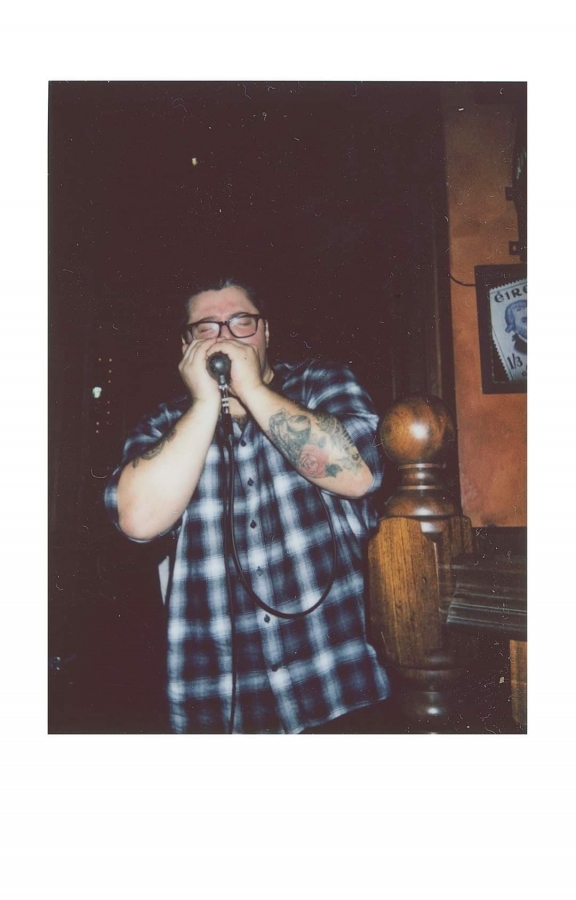Few people have made a name for themselves in the Austin blues scene faster than Vin Mott. The week he arrived, Mott sat in at the Little Elmore Reed Blues Band’s weekly residency in the heart of the East Side, fiercely blowing into his harp with a determination that couldn’t be ignored. Mott quickly brought his harmonica driven intensity to Rainey Street with a weekend residency at Clive Bar that exposed a younger audience to a century of traditional sounds.
The train may have stalled with venue closures amid the Coronavirus pandemic, but Mott isn’t one to twiddle his thumbs. Country Blues in Quarantine i s Mott’s most transparent release, showing off his intensity for the music and his versatility on instrumentation. Mott performed vocals, harmonica, guitar and drums on the album along with Steven Kirsty on bass.
Mott started taking drum lessons at the age of seven, and took advantage of every music program available throughout grade school in New Jersey. His talent granted him acceptance into the prestigious Berklee College of Music in Boston, and after graduation in 2011, Mott returned to New Jersey and put together a traditional harmonica-driven blues band. After gaining notoriety and releasing his debut album Quit the Woman for the Blues, Mott was advised by songwriter and guitarist Bob Lanza to take a look at the Texas blues scene.
“I would tour alone actually in my Jeep,” Mott said, “and travel the country and play the blues. I strung together gigs basically to and from Texas, and I did that twice in two years.”
Mott was immediately drawn to the thriving atmosphere that put the Austin blues scene on the map, and loaded up every inch of his Jeep with music equipment and clothing.
“It just came down to making a decision,” Mott said. “I could either sit back home and continue doing the same stuff I’m doing for the rest of my life, or I could take a shot while I’m young, and while I dont have too much commitment. I don’t have a wife, or a kid, or a house to take care of. It’s now or never really.”
In his first two months in Austin, Mott found a weekly spot on drums at the Big Easy with Matthew Brodnax and the Blues Sherpas, a happy hour gig with pianist Henry Herbert at Skull Mechanix Brewery and led a full band with traditional and original material. Two of the venues Mott performed at have since closed, with another up for sale due to mandated Coronavirus shut downs.
“I started to build a little bit of something until everything shut down here. I got like every email from every one of my gigs all in one day that everything was cancelled,” Mott said with a laugh. “I got here just in time.”
As working musicians watched Coronavirus mandates effectively end live performing in major metropolitan areas, Mott purchased a $50 acoustic guitar on Facebook Marketplace, borrowed an audio interface from local guitarist Chris Ruest, plugged in his Shure SM 58 microphone and
started laying down tracks for Country Blues in Quarantine in his Oak Hill apartment. Mott later sent the tracks to Kirsty in New York for upright bass.
“I had a little well of songs that I had been writing since my last record,” Mott said. “I had always wanted to start learning to record myself, I had just a very bare bones knowledge of how to do it. It was something that was always in the back of my mind.”
Mott focused on open tuning and traditional slide on the guitar to back up his harmonica. The style fits perfectly on the quick country blues opening track “Buck 110 Blues,” and provides a sweeping low down grit on “The Werewolf.”
“My influences are in that traditional Delta blues vein, on this record especially, and I just felt like that was what I wanted to try and do, even with my limited skills,” Mott said. “I almost think it’s cooler to suck a little bit, you know? It’s almost like the punk rock attitude in a blues setting.”
Mott’s humble attitude may give a nod to the artists that caught his attention in the blues genre, but the guitar playing and DIY attitude put forth on Country Blues in Quarantine can’t be understated.
“It forced me to look at my life, and how I make money, and being a musician,” Mott said. “It’s never too late to learn a new skill, and now’s the best time to learn a new skill, so I’m just trying to take advantage of what is positive about it, you know? It’s a blessing in disguise in that way.”
Mott’s future in the Austin blues scene remains as uncertain as the venues that featured nightly acts earlier this year. A recent Facebook post indicated a possible return to New Jersey to be with family through the pandemic, but Mott feels a connection to the audiences he’s performed for.”
“That’s the whole reason why I fell in love with Austin,” Mott said. “No matter what you’re doing, or what you’re playing, there’s more appreciation for the artists and the music.”
Country Blues in Quarantine combines powerful vocals with intense instrumentation and an obsession with the traditional Americana recordings that have spread around the world.
“This is the deepest dive into my mind as you’re going to get,” Mott said. “It’s purely me. It’s purely my sound and the way I feel it and hear it.”
-Andrew Blanton
